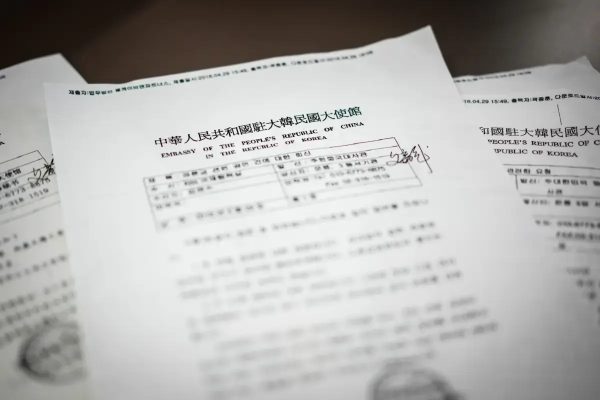Amid rising tension surrounding cultural expression, U.S. officials, including members of Congress, have voiced concerns over allegations that the Chinese Communist Party (CCP) is applying pressure on South Korean venues to prevent Shen Yun Performing Arts from performing in the nation.
According to findings by The Epoch Times, the People’s Republic of China (PRC) Embassy in South Korea purportedly “leveraged economic and diplomatic means” to dissuade local theaters from hosting Shen Yun.
Founded in 2006 and based in New York, Shen Yun is the world’s premier classical Chinese dance and music company — showcasing 5,000 years of traditional Chinese art and culture prior to the ravages of communism. In order to meet the high demand of its performances, the company currently has eight equally-sized troupes that tour and perform around the world simultaneously — putting on a brand new production every year.

‘Economic coercion’
A spokesperson for the State Department said on Nov. 7 that Communist China’s purported interference is “of concern,” and added that the U.S. would address the issue of “economic coercion” by China in partnership with Japan and other allies in the Indo-Pacific region.
“The PRC has a very clear track record of using economic coercion and otherwise in a wide array of countries,” said State Department spokesman and Principal Deputy Vedant Patel, as he alluded to China’s proclivity for using economic influence to bend international will and assert its dominance by force.
Success
You are now signed up for our newsletter
Success
Check your email to complete sign up
Shen Yun, which is based in upstate New York, was founded by practitioners of Falun Gong, a traditional spiritual discipline that is heavily persecuted by the CCP. Some of Shen Yun’s dances include depictions of the violence perpetrated by the communist regime against Falun Gong and others in China.
Owing to Shen Yun’s broad presence and commercial success abroad, the CCP has tried to apply various kinds of pressure to undermine the company.
While most of these efforts fall flat, the CCP’s influence has been a recurring challenge for Shen Yun in South Korea — with this year marking an escalation in harassment, media outlets noted. According to New York-based New Tang Dynasty Television (NTD), a representative from the Chinese Embassy in Seoul openly admitted to obstructing Shen Yun’s efforts to secure performance venues.
Zhang Jiafan, a public relations officer working at the embassy, claimed in an interview with NTD that, “We tell them it’s not legal to let Shen Yun Performing Arts … apply [for] permission in a Korean theater to have their performances. This is our position.”
U.S. Representative Ralph Norman (R-S.C.) criticized the Chinese officials’ actions, stating, “It demonstrates a strange sense of insecurity for Chinese officials to sabotage things that remind the world of their nation’s remarkable culture and heritage prior to the destructive governance of their communist regime.”
‘Decades of influence’
Rep. Nicole Malliotakis (R-N.Y.), who recently met with South Korean President Yoon Suk Yeol, stressed the importance of contesting the Chinese regime’s suppression of freedom of expression. She emphasized the CCP’s continued pressure on Shen Yun and its unmitigated efforts to suppress artistic and cultural exchange whenever it “doesn’t fit their narrative.”
“We don’t appreciate that an American dance company is not being allowed to perform there because of pressure from communist China,” she said, adding, “We have to just continue to challenge it at every turn.”
The broader implications of China’s assertiveness within South Korea have been highlighted by former South Korean cultural official Han Minho and Russell Hsiao of the Global Taiwan Institute — both of whom pointed out “decades of influence” through trade and cultural engagement to establish a pro-PRC sentiment across various South Korean sectors.
RELATED: South Korea Forges Tougher Approach to Handle Nuclear-armed North
According to Han, the CCP has been clandestinely working to undermine South Korea through United Front activities. “It has created a lot of pro-China people in all walks of life, especially local politicians, influential business people, and journalists,” he told The Epoch Times.
“For example, the whole country of South Korea, as well as local governments, has been trading with China for a long time, and [CCP officials] threaten to cut off this trade relationship, or not to send tourists, or not to send international students.”
U.S. Representative Tim Burchett (R-Tenn) added that the CCP’s suppression is in line with the typical communist strategy of censoring any negative portrayals, with Shen Yun’s inability to perform in China and elsewhere tied to Beijing’s authoritarian grip on cultural narratives.
However, despite the CCP’s alleged tactics ranging from coercion to more aggressive measures — including sabotaging the transportation of performers — there is hope among U.S. lawmakers that South Korea will resist this pressure.
Katrina Lantos Swett, President of the Lantos Foundation for Human Rights and Justice, called upon South Korean officials to uphold the principles of free expression, stating, “It is shameful, though hardly surprising, that the Chinese government is reaching beyond its borders and attempting to suppress Shen Yun performances in South Korea.”















